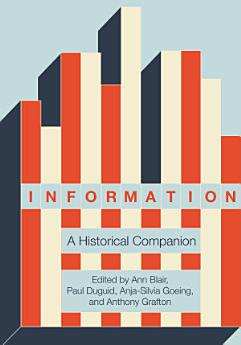Information: A Historical Companion
Ann Blair · Paul Duguid · Anja-Silvia Goeing · Anthony Grafton
Jan 2021 · Princeton University Press
Ebook
904
Pages
family_home
Eligible
info
reportRatings and reviews aren’t verified Learn More
About this ebook
A landmark history that traces the creation, management, and sharing of information through six centuries
Thanks to modern technological advances, we now enjoy seemingly unlimited access to information. Yet how did information become so central to our everyday lives, and how did its processing and storage make our data-driven era possible? This volume is the first to consider these questions in comprehensive detail, tracing the global emergence of information practices, technologies, and more, from the premodern era to the present. With entries spanning archivists to algorithms and scribes to surveilling, this is the ultimate reference on how information has shaped and been shaped by societies.
Written by an international team of experts, the book's inspired and original long- and short-form contributions reconstruct the rise of human approaches to creating, managing, and sharing facts and knowledge. Thirteen full-length chapters discuss the role of information in pivotal epochs and regions, with chief emphasis on Europe and North America, but also substantive treatment of other parts of the world as well as current global interconnections. More than 100 alphabetical entries follow, focusing on specific tools, methods, and concepts—from ancient coins to the office memo, and censorship to plagiarism. The result is a wide-ranging, deeply immersive collection that will appeal to anyone drawn to the story behind our modern mania for an informed existence.Concepts: data, intellectual property, privacy Formats and genres: books, databases, maps, newspapers, scrolls and rolls, social media People: archivists, diplomats and spies, readers, secretaries, teachers Practices: censorship, forecasting, learning, political reporting, translating Processes: digitization, quantification, storage and search Systems: bureaucracy, platforms, telecommunications Technologies: cameras, computers, lithography
Thanks to modern technological advances, we now enjoy seemingly unlimited access to information. Yet how did information become so central to our everyday lives, and how did its processing and storage make our data-driven era possible? This volume is the first to consider these questions in comprehensive detail, tracing the global emergence of information practices, technologies, and more, from the premodern era to the present. With entries spanning archivists to algorithms and scribes to surveilling, this is the ultimate reference on how information has shaped and been shaped by societies.
Written by an international team of experts, the book's inspired and original long- and short-form contributions reconstruct the rise of human approaches to creating, managing, and sharing facts and knowledge. Thirteen full-length chapters discuss the role of information in pivotal epochs and regions, with chief emphasis on Europe and North America, but also substantive treatment of other parts of the world as well as current global interconnections. More than 100 alphabetical entries follow, focusing on specific tools, methods, and concepts—from ancient coins to the office memo, and censorship to plagiarism. The result is a wide-ranging, deeply immersive collection that will appeal to anyone drawn to the story behind our modern mania for an informed existence.
- Tells the story of information’s rise from 1450 through to today
- Covers a range of eras and regions, including the medieval Islamic world, late imperial East Asia, early modern and modern Europe, and modern North America
- Includes 100 concise articles on wide-ranging topics:
- Provides an informative glossary, suggested further reading (a short bibliography accompanies each entry), and a detailed index
- Written by an international team of notable contributors, including Jeremy Adelman, Lorraine Daston, Devin Fitzgerald, John-Paul Ghobrial, Lisa Gitelman, Earle Havens, Randolph C. Head, Niv Horesh, Sarah Igo, Richard R. John, Lauren Kassell, Pamela Long, Erin McGuirl, David McKitterick, Elias Muhanna, Thomas S. Mullaney, Carla Nappi, Craig Robertson, Daniel Rosenberg, Neil Safier, Haun Saussy, Will Slauter, Jacob Soll, Heidi Tworek, Siva Vaidhyanathan, Alexandra Walsham, and many more.
About the author
Ann Blair is the Carl H. Pforzheimer University Professor at Harvard University. Paul Duguid is an adjunct full professor in the School of Information at the University of California, Berkeley. Anja-Silvia Goeing is professor of history of education at the University of Zurich and an associate in history at Harvard University. Twitter @debatesovert Anthony Grafton is the Henry Putnam University Professor of History at Princeton University. Twitter @scaliger
Rate this ebook
Tell us what you think.
Reading information
Smartphones and tablets
Install the Google Play Books app for Android and iPad/iPhone. It syncs automatically with your account and allows you to read online or offline wherever you are.
Laptops and computers
You can listen to audiobooks purchased on Google Play using your computer's web browser.
eReaders and other devices
To read on e-ink devices like Kobo eReaders, you'll need to download a file and transfer it to your device. Follow the detailed Help Center instructions to transfer the files to supported eReaders.






